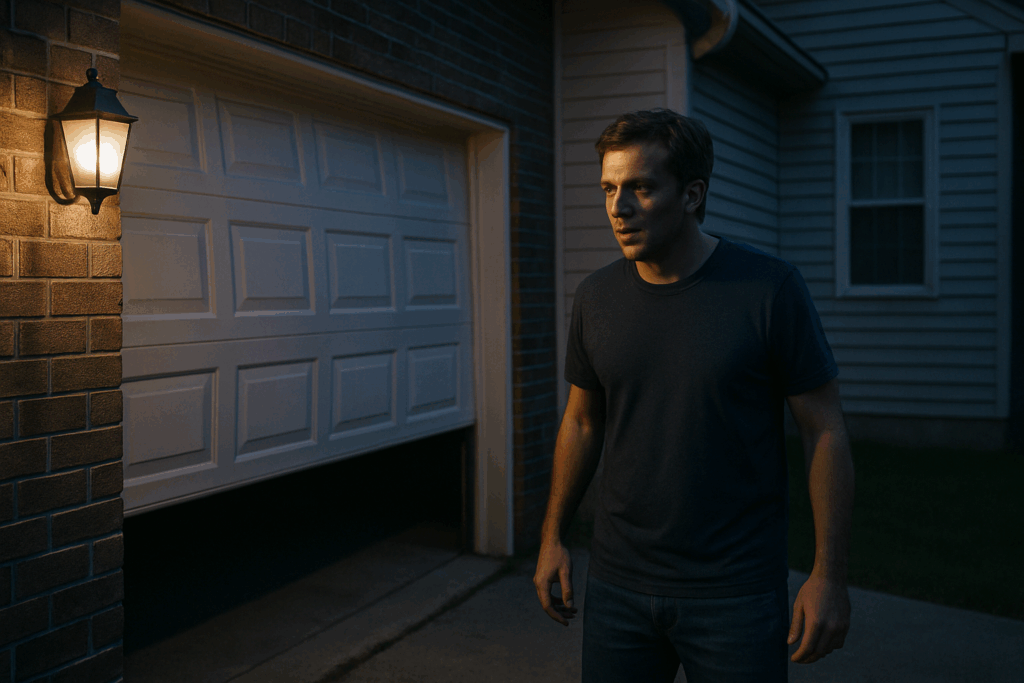
Finding your garage door open when you distinctly remember closing it can be a startling and unsettling experience. It immediately triggers questions about security and the mysterious behavior of your home’s entry points.
You might walk outside only to discover your garage door opening and closing seemingly on its own, or worse, find it wide open after you’ve been away. This isn’t just a minor glitch; a garage door that opens unexpectedly can compromise the security of your home and belongings, allowing easy access for unwelcome visitors.
It can also expose the contents of your garage door to the elements. So, why does my garage door opener opening by itself? This frustrating issue has several potential culprits, ranging from simple user error or remote problems to more complex electrical or mechanical failures within the garage door system.
Understanding the possible reasons why your garage door is behaving this way is the first step to fixing it and ensuring the safety of your home. In this comprehensive guide, we will explore the most common reasons behind a garage door opening by itself, provide troubleshooting steps you can take, and advise you on when it’s essential to call a garage door technician to get your garage door working properly again. Let’s get to the root of your garage door problem.
Understanding Your Garage Door System
Before we dive into the reasons why your garage door opener opening by itself might be happening, it’s helpful to have a basic understanding of how your garage door system works. It’s more than just a door that goes up and down.
The core of the system is the garage door opener unit itself. This is the motor and mechanism, usually mounted on the ceiling of your garage, that provides the power to lift and lower the heavy garage doors.
This opener unit connects to the door track system, which guides the rollers on the sides of the garage door as it moves. Proper alignment of the door track is crucial for smooth operation.
You interact with the opener using controls. These include portable garage door remotes, a wired wall button typically located inside the garage near the entry door, and sometimes an external wireless keypad.
Finally, a critical safety feature on modern systems are the garage door sensors. These are small units placed low on either side of the door track. They emit a beam that, if broken while the door is closing, tells the opener to stop or reverse the door to prevent crushing objects or people.
Understanding these key parts – the opener unit, track, controls, and sensors – gives you a better picture of the system. It helps in diagnosing potential issues when your garage door randomly opens. Keep in mind that older garage door openers might have fewer features or different types of controls compared to a modern garage door.
Common Reasons Why Your Garage Door Opens Randomly
| Cause | Quick Explanation |
|---|---|
| Stuck Remote or Keypad Button | Constantly sends ‘open’ signal |
| Faulty Circuit Board | Worn parts are causing erratic behavior |
| Wiring Problems | Malfunctions can randomly activate the opener |
| External Signal Interference | Shorts or loose wires mimic an open command |
| Power Surges/Outages | Causes system glitches and resets |
| Old Opener Unit | Rare cases like radio interference |
| Stuck Wall Button | Constant open command sent |
| Damaged External Keypad | Rare cases like radio interfering |
It can be incredibly puzzling and frustrating when your garage door keeps opening without you pressing a button. Pinpointing the exact cause requires looking at the different parts of your garage door system. Several issues could be the reason your garage door is acting this way.
Let’s explore the most frequent culprits behind a garage door opening by itself. Identifying the source is key to getting your garage door to work properly.
Issues with Your Garage Door Remote or Keypad
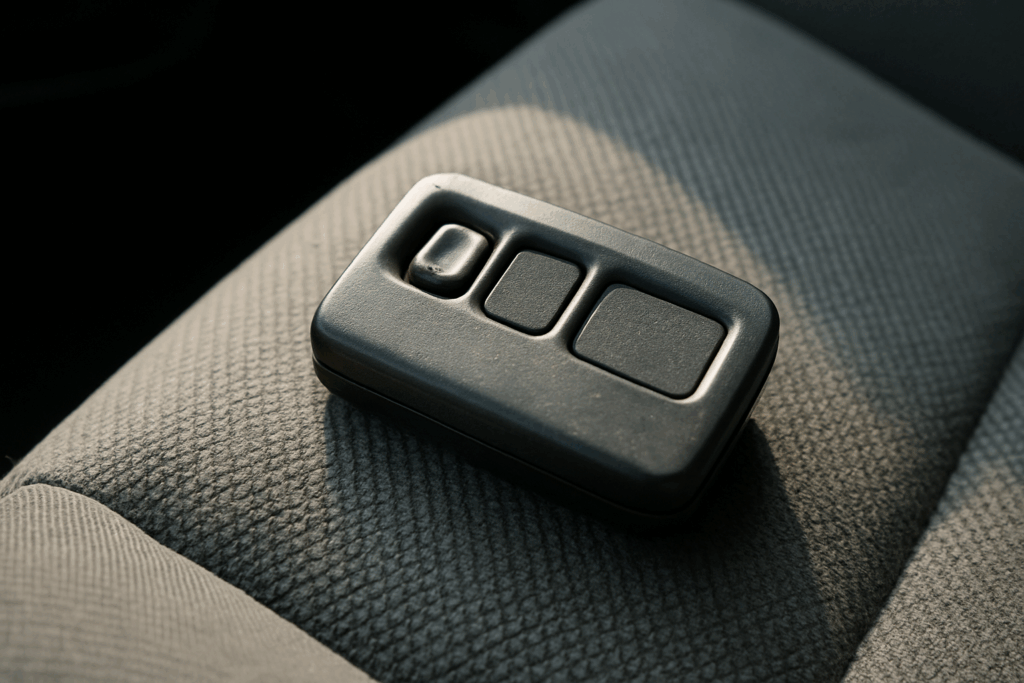
One of the most common and simplest explanations for a garage door randomly opens is a problem with the control devices you use daily. This includes your portable garage door remotes and any external wireless keypads.
A remote might have a stuck button. If something is pressing against a remote in your pocket, car, or a drawer, it can constantly send the ‘open’ signal to the opener unit. This can easily cause your garage door to open.
Similarly, if you have an external keypad, a faulty or damaged button could be sending phantom signals. Even subtle pressure or damage might cause the door to open.
Another possibility, especially with older garage door openers, is signal interference. Your neighbor’s garage door opener on a similar frequency might accidentally trigger your garage door to open unexpectedly. This is less common with newer, more secure rolling-code technologies.
Sometimes, a damaged remote or keypad might have internal issues. These can cause it to transmit random signals, explaining why your garage door opener opening by itself. Checking the condition of all your remotes and keypads is a good first step.
Problems with the Garage Door Opener Circuit Board
The central control unit of your garage door opener is the circuit board. Think of it as the brain that receives commands and tells the motor what to do.
Like any electronic component, the garage door opener circuit board can malfunction. This can happen due to age, wear and tear, or electrical events.
A faulty circuit board might misinterpret signals or send out commands spontaneously. This could easily be the cause your garage door starts moving on its own.
Issues like short circuits or component failures on the board can lead to unpredictable behavior, including the garage door opening and closing randomly. Diagnosing circuit board problems often requires a professional.
Electrical Problems and Wiring Issues
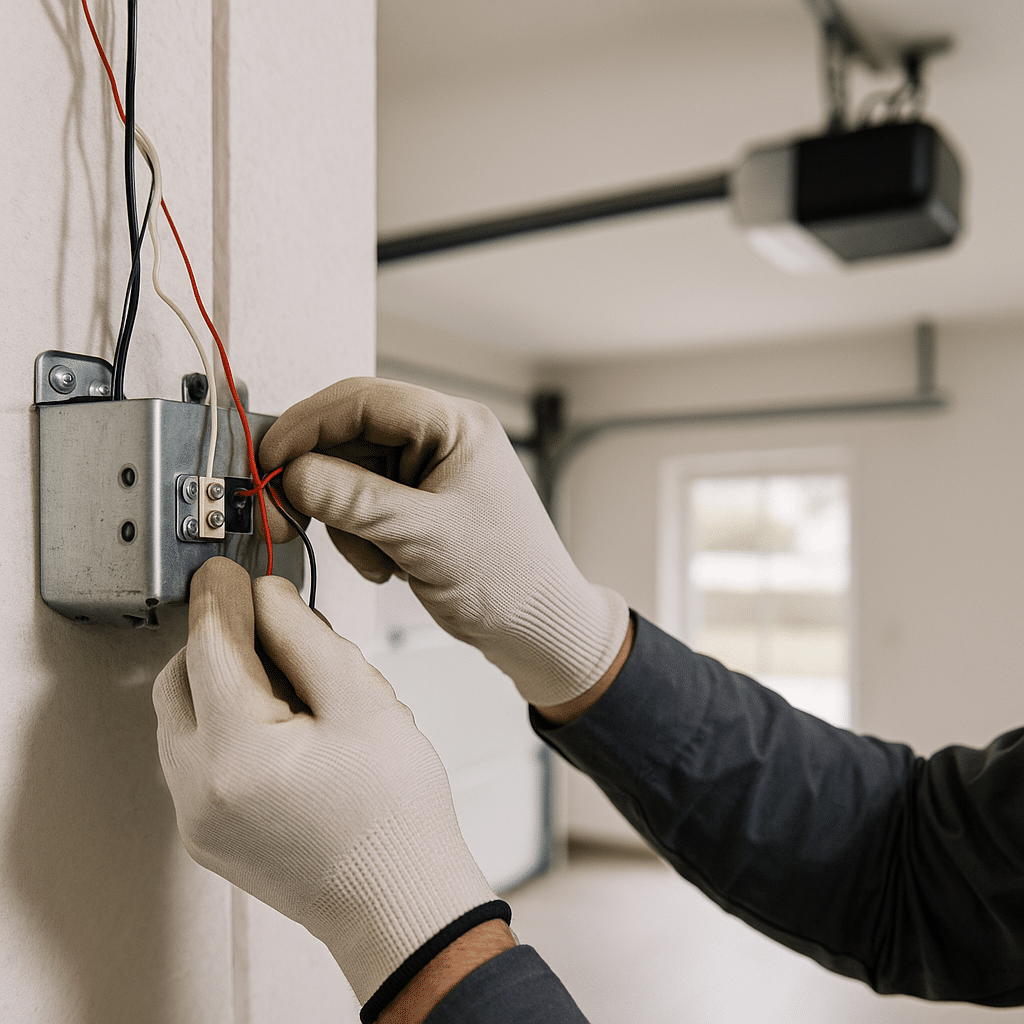
Your garage door opener is connected to your home’s electrical system and also has low-voltage wiring for the wall button and safety sensors. Problems with this wiring can cause the door to open.
Frayed wires, loose connections, or damaged insulation can create short circuits. A short can sometimes mimic the signal from a wall button, telling the opener to activate.
Wiring issues might occur anywhere along the path, from the outlet the opener is plugged into, to the wires running to the wall console or the garage door sensors. Even wiring inside the opener unit itself could be the root of your garage door problem.
Ensuring all electrical connections are secure and the wiring is undamaged is important. However, dealing with electrical components requires caution.
External Signal Interference
While less common now, external radio frequency interference can still affect some garage door openers, particularly older garage door openers. Various devices transmit radio waves.
Sources like nearby amateur radios, military bases, or even certain medical devices have been known in rare cases to interfere with garage door opener frequencies. This interference could potentially trigger the door to open.
This is particularly relevant if your opener uses a fixed radio code. Modern garage door openers use “rolling codes” that change every time, making them much less susceptible to this kind of external signal interference.
If the random opening coincides with nearby events or specific times, interference might be a possibility.
Power Fluctuations or Outages
Unexpected power events can sometimes affect electronic devices. Power surges, brownouts (temporary drops in voltage), or brief power outages can cause the garage door opener‘s electronics to behave erratically.
When power is restored after an outage, the opener might sometimes perform an unintended cycle. This could potentially include the garage door to open randomly.
While not a direct command, the jolt or interruption to the power supply can sometimes cause the system to glitch. A quick reset your garage door opener might resolve issues caused by minor power blips.
An Old or Malfunctioning Garage Door Opener
Garage door openers don’t last forever. Like any mechanical and electrical device, they can wear out over time. An older garage door opener is more likely to develop internal problems.
Components within the motor unit, such as the circuit board, gears, or motor itself, can degrade. This can lead to unpredictable operation.
Internal failures in an older garage door opener could send false signals or cause the mechanism to activate randomly. This makes age a significant factor in why your garage door opener opening by itself.
If your opener is decades old, its reliability decreases, and it might be the primary cause your garage door opens without command. Replacement might be the best solution in such cases.
Stuck Buttons on the Wall Console
Most garages have a wired button mounted on the wall inside the garage that controls the door. This wall console is a direct wired connection to the opener unit.
If the button on this wall console becomes stuck, damaged, or has wiring issues behind it, it could constantly send an ‘open’ signal to the opener. This can directly cause the door to open.
Checking this button visually and ensuring it’s not physically stuck is a simple troubleshooting step. Problems with the low-voltage wiring running to the wall console can also cause similar issues.
Issues with External Keypads
Similar to remotes, wireless keypads mounted outside your garage offer convenient access. However, they are also electronic devices that can malfunction.
A damaged keypad, moisture intrusion, or internal electronic failures could cause the keypad to send unintended open signals to the opener. This could be another reason why your garage door is opening on its own.
Testing the keypad and potentially removing its batteries temporarily can help rule it out as the source of the problem.
Physical Obstructions (Less Likely for Opening)
While physical obstructions are a very common reason a garage door stops or reverses when closing, they are less likely to cause a garage door to open by itself. However, in rare cases, something interfering with the travel limits or the door track could potentially confuse the system.
For example, something lodged in the door track might bind the door’s movement. While this usually prevents closing, it’s part of checking the entire garage door system for smooth operation. It’s worth mentioning as part of a comprehensive check, although not a primary cause for spontaneous opening.
These are the most common explanations for why your garage door opener opening by itself. Now that we’ve covered the potential causes, let’s look at what you can do to troubleshoot the problem yourself.
Troubleshooting Steps You Can Take When Your Garage Door Opens Unexpectedly
Facing a garage door randomly opens situation can be stressful, but there are several checks you can perform yourself. These steps can help you diagnose the problem and potentially find a simple fix. Take your time and go through each one systematically to get to the root of your garage door issue.
Here are some actions you can take when you find your garage door opening by itself:
Check All Your Garage Door Remotes and Keypads
The easiest potential cause of the door opening is a problem with the remote control or keypad. Gather every garage door remote you own, including those in cars, on keychains, or in drawers.
Inspect each remote carefully. Is a button stuck in the pressed position? Sometimes, debris or damage can cause a button to constantly transmit a signal.
If you have an external wireless keypad, check its buttons as well. Look for any physical damage or signs of wear that might cause a button to stick.
To test if a remote or keypad is the culprit, try removing the batteries from all of them. For wired wall consoles, you might need to temporarily disconnect the low-voltage wires (usually clearly marked on the opener unit – consult your manual). If the random opening stops after doing this, you’ve likely found your reason your garage door was acting up.
Inspect the Garage Door Sensors
Your garage door sensors are crucial safety devices. While they primarily prevent the door from closing on people or objects, a malfunction could potentially cause erratic behavior in the system.
Check the alignment of the sensors located on either side of the garage door track, near the floor. The two units need a clear line of sight to each other.
Look for anything obstructing the beam between the sensors, such as cobwebs, dirt, leaves, or tools left near the track. Clean the lenses if they are dirty.
Most sensors have indicator lights that show if they are powered and properly aligned. Consult your opener’s manual to understand what these lights mean (e.g., solid green often means aligned, flashing red might indicate an issue). Ensure both lights are on and solid if that’s what the manual indicates for correct operation.
Examine Wiring Connections
Problems with the low-voltage wiring connected to your garage door opener can mimic a command. This wiring typically runs from the opener unit to the wall console.
Safely inspect the wires connected to the opener unit terminals. Look for any wires that appear loose, frayed, or damaged.
Also, check the wiring connections at the wall console itself. Ensure they are secure. Older garage door systems or wiring exposed to damage (like from pests) are more prone to these issues.
Important Safety Note: Only examine the low-voltage wiring. Do not attempt to inspect or repair the main electrical power cord or the internal electrical components of the opener unit unless you are qualified and have turned off the power at the circuit breaker.
Reset Your Garage Door Opener
Just like rebooting a computer can fix glitches, sometimes simply resetting your garage door opener can resolve temporary electronic issues. This might stop the garage door to open randomly.
The standard way to reset your garage door opener is to unplug the unit from the electrical outlet for about 60 seconds. Then, plug it back in.
This power cycle can clear minor errors in the garage door opener circuit board or system memory that might be causing the unexpected opening. Consult your opener’s manual for specific reset procedures, as some models might have a reset button or fuse.
Look for Physical Obstructions in the Door Track
While less common for causing the door to open spontaneously, anything binding the movement of the garage door can cause stress on the opener and lead to unpredictable operation.
Check the door track on both sides of the garage door. Look for any objects, debris, or damage that might be impeding the smooth travel of the rollers.
Ensure the door moves freely by hand when the opener’s emergency release is pulled (only do this with the door fully closed, or if you are strong enough to handle the door’s weight if partially open – garage doors are heavy!). A door that binds might stress the opener and lead to odd behavior.
Test the Wall Button
Finally, focus on the wired wall console inside your garage. This is a direct line of communication to the opener.
Check if the button on the wall console is stuck in. Press it a few times to see if it moves freely.
If you suspect the wall console is the problem, you can temporarily disconnect its wires from the opener unit (again, low-voltage wires only, power off the unit first). If the random opening stops, the issue is likely with the wall button or its wiring.
Going through these troubleshooting steps systematically can help you narrow down the possibilities for why your garage door opener opening by itself. If after these checks the problem persists, it might be time to consider more complex issues or call in a professional.
Security Concerns When Your Garage Door Opens By Itself
Beyond the annoyance, a garage door opening by itself poses a significant security risk to your home. Your garage often provides a direct entry point into your house. An open garage door is an open invitation for theft or unauthorized entry.
If you discover your garage door open unexpectedly, your first thought should be about securing your property. Addressing the underlying issue why your garage door opener opening by itself is essential, but immediate security needs attention first.
What to Do Immediately
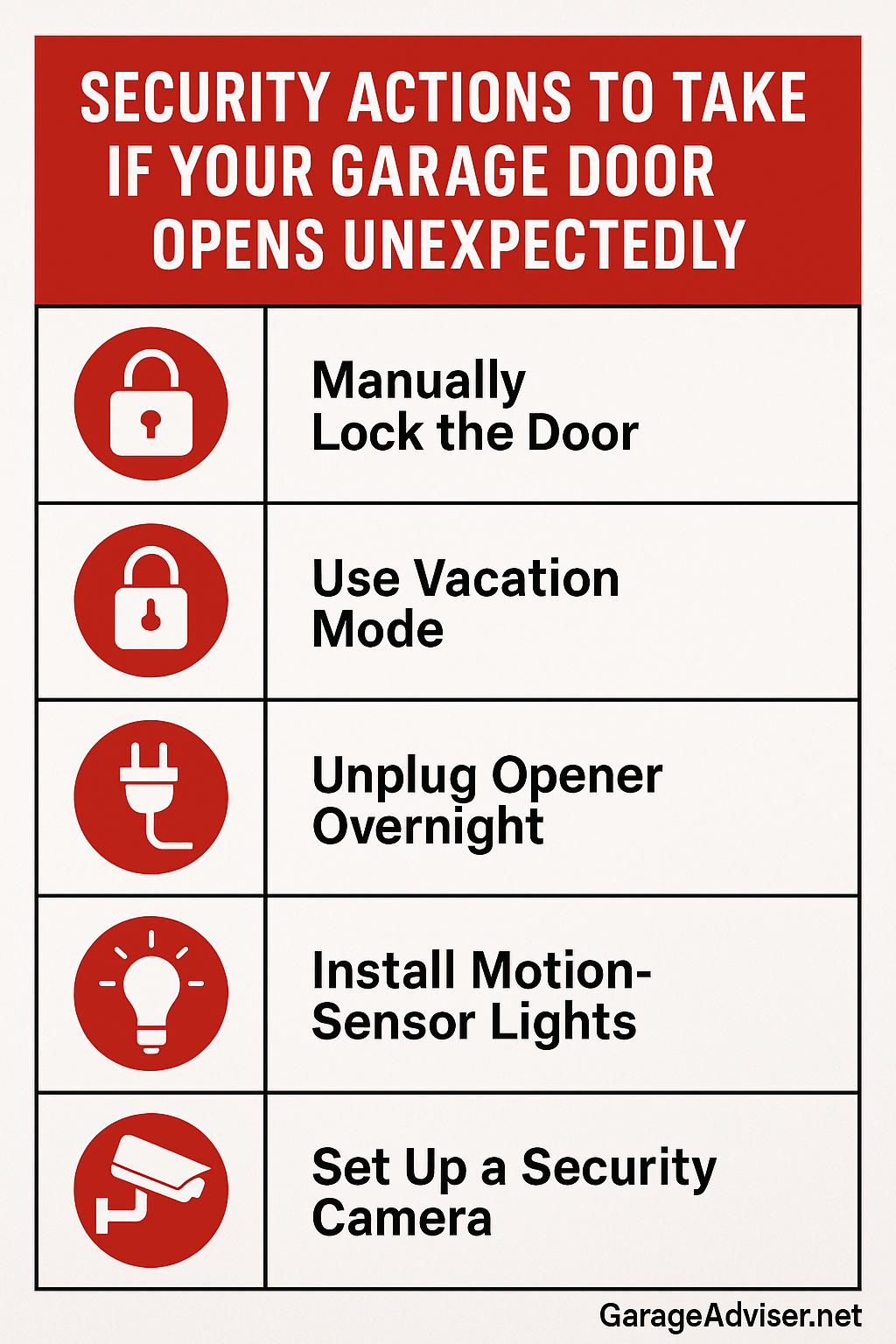
If you find your garage door randomly opens, especially when you’re not home, take steps to secure it right away. You need to prevent potential intruders from gaining access to your garage and potentially your home.
One immediate action is to manually lock the garage door. Many garage doors have a manual locking mechanism, often a slide lock on one of the sections that engages with the door track. Engage this lock to prevent the door from being opened electronically.
Most garage door openers also have a “vacation lock” or “security lock” feature. This feature disables the opener’s response to remote controls. Consult your owner’s manual for how to activate this setting. While activated, only the hardwired wall button inside the garage will operate the door.
If the random opening is happening frequently and you cannot immediately diagnose or fix it, consider unplugging the garage door opener unit from the ceiling outlet overnight or when you are away. This completely deactivates the electronic opening mechanism. Remember to use the manual lock on the door if you do this, as the opener motor will no longer hold the door closed.
How to Enhance Your Garage Security
Once you’ve addressed the immediate issue and are working on fixing why your garage door opener opening by itself, consider long-term security enhancements. Improving garage security adds layers of protection.
Install motion-sensor lights inside and outside the garage. Sudden bright lights can deter potential intruders who might see an unexpectedly open garage door as an opportunity.
Consider adding a security camera overlooking the garage door. Many modern security systems or smart home devices offer cameras that can alert you via your phone if motion is detected or if the garage door opens. This gives you visibility even when you’re away.
Upgrading to a modern garage door opener can also improve security. Newer models often feature rolling code technology, making it virtually impossible for someone to steal your remote signal. Some also integrate with smart home systems, allowing you to monitor and control your garage door remotely. This can provide peace of mind knowing the status of your garage door opening and closing.
Reinforce the entry door from the garage into your house. Ensure it’s a solid core door with a strong deadbolt. Even if someone gains access to the garage via a randomly opened door, this provides a crucial barrier to your living space. Taking these steps can significantly reduce the security risk associated with a garage door that opens unexpectedly.
When to Call a Garage Door Professional
While some issues causing your garage door to randomly open can be fixed with simple troubleshooting, many others require the expertise of a trained technician. Dealing with garage door systems can be complex and even dangerous if you don’t know what you’re doing. Knowing when to call a garage door professional is crucial for safety and effective repair.
Don’t hesitate to reach out for help if you encounter the following situations. A qualified garage door technician can help diagnose and fix the issue correctly.
Complex Electrical or Circuit Board Issues
If your troubleshooting points towards a problem with the garage door opener circuit board or the internal wiring of the opener unit, it’s best to call a garage door technician. These components are intricate and require specialized knowledge to repair.
Tampering with the opener’s internal electrical system can cause further damage. More importantly, it poses a risk of electrical shock. A professional garage door technician has the tools and expertise to safely diagnose and repair these issues. They understand the complexities of the garage door system.
Inability to Identify the Cause
You might have gone through all the troubleshooting steps mentioned earlier. You checked remotes, sensors, wiring, and reset the unit, but your garage door keeps opening without explanation. In such cases, the problem is likely more complex than a simple fix.
When you cannot pinpoint the reason your garage door is misbehaving, it’s time to enlist professional help. A garage door technician has experience with a wide range of issues and can often diagnose the problem quickly using specialized equipment. They can investigate potential causes you might not have considered.
Suspected Opener Malfunction
If your garage door opener is old or has been acting up in other ways (like making strange noises or struggling to lift the door), the random opening could be a sign of a larger internal problem. An older garage door opener is more prone to wear and tear on its components.
If you suspect the opener unit itself is failing or has internal mechanical issues, a professional garage door service can assess its condition. They can determine if the opener can be repaired or if replacement with a modern garage door opener is the more cost-effective solution. They can explain the pros and cons based on the age and condition of your unit.
For Comprehensive System Inspection
Sometimes, the random opening might be a symptom of a broader issue within the entire garage door system. Problems with the springs, cables, or the alignment of the door track can sometimes put undue stress on the opener, leading to malfunctions.
A garage door professional can perform a thorough inspection of all components. They can check the door’s balance, inspect the springs and cables (which are under high tension and dangerous to work on), and ensure the door track is aligned and free of obstructions. This comprehensive check ensures the entire garage door system is operating safely and correctly.
When Safety is a Concern
This is perhaps the most important reason to call a garage door professional. Working on garage doors and openers can be dangerous. Garage doors are heavy, and components like springs are under immense tension.
Attempting repairs you’re not equipped for can lead to serious injury or further damage to the system. If you feel uncomfortable, unsure, or the issue involves components under tension, it’s always safest to call a garage door technician. They have the training, tools, and experience to perform repairs safely and effectively. Don’t take risks with your safety or the integrity of your garage door service.
Preventing Your Garage Door from Opening Unexpectedly
Once you’ve identified and fixed the reason why your garage door opener opening by itself, you’ll want to take steps to avoid a repeat performance. Prevention is often easier and less costly than reacting to a problem. Regular care and attention to your garage door system can save you headaches down the road.
Here are some key ways to help ensure your garage door operates reliably and securely.
Regular Garage Door Maintenance
Consistent maintenance is vital for the health and longevity of your entire garage door system. Think of it like regular oil changes for your car; it helps prevent major problems.
Perform visual inspections regularly. Look at the door track for any signs of damage or obstructions. Check the rollers to make sure they are moving smoothly.
Lubricate the moving parts, including the rollers, hinges, and springs, using a silicone-based lubricant specifically designed for garage doors. This reduces friction and wear, helping the system run smoothly.
Test the garage door sensors monthly. Wave an object (like a broom handle) through the sensor beam while the door is closing. The door should immediately stop or reverse. If it doesn’t, the sensors need attention, as they are crucial safety devices.
Regular maintenance helps catch small issues before they become bigger problems. It ensures all components are working together correctly, reducing the chance of a malfunctioning garage door that opens unpredictably. Consider scheduling an annual check-up with a garage door professional for a thorough inspection and tune-up.
Updating Older Garage Door Openers
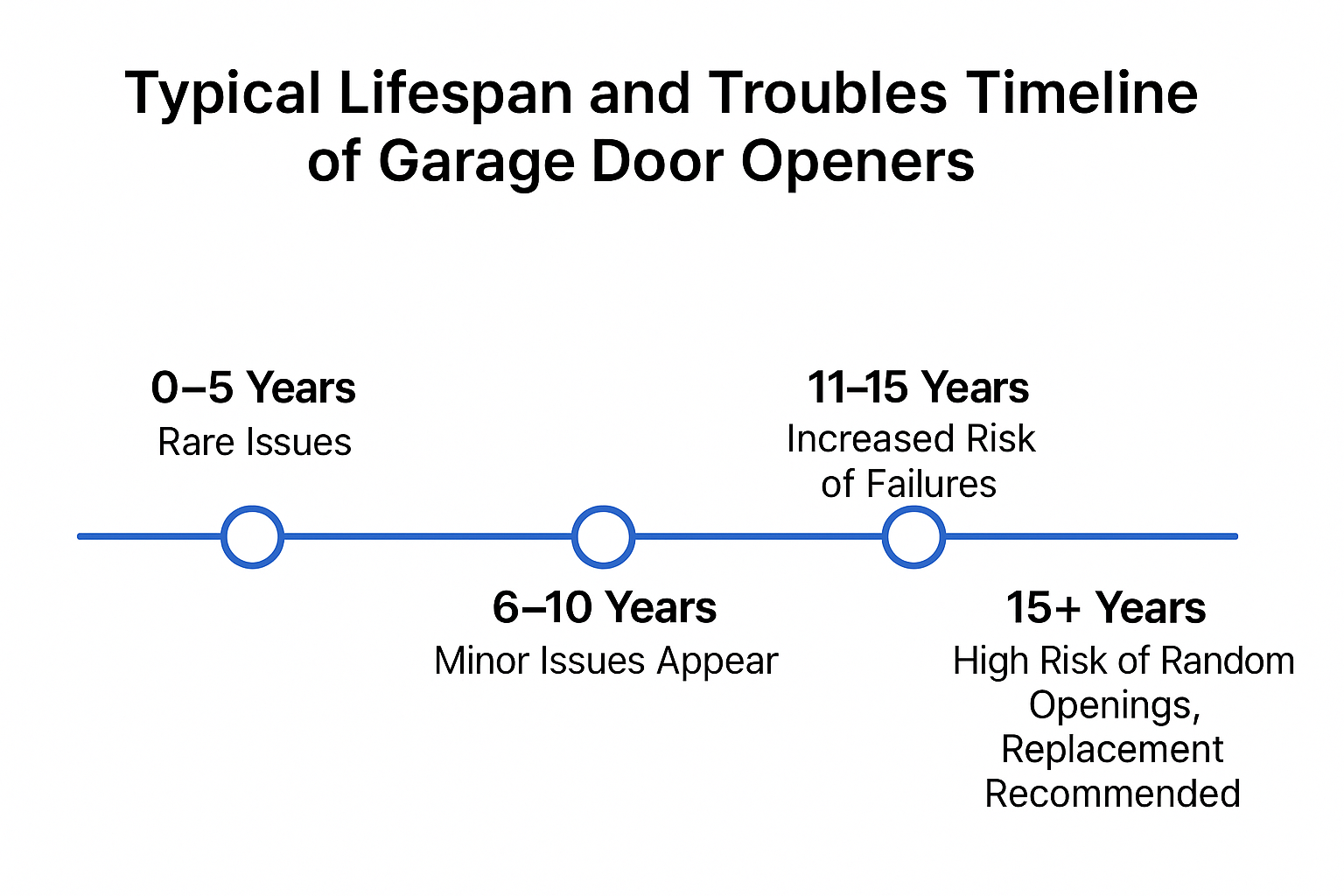
If your garage door opener is several decades old, it might be time to consider an upgrade. Older garage door openers are more susceptible to interference and electronic glitches.
Modern garage door openers use advanced technology, such as rolling codes, which change the access code every time the remote is used. This dramatically reduces the risk of signal hijacking that could cause the door to open unexpectedly due to external interference or a neighbor’s remote.
| Feature | Older Openers | Modern Openers |
|---|---|---|
| Signal Security | Fixed codes (easier to hijack) | Rolling codes (highly secure) |
| Remote Range | Limited | Extended and reliable |
| Smart Home Integration | Rare or none | Often included |
| Risk of Malfunctions | High with age | Lower |
| Energy Efficiency | Less efficient | More efficient |
Newer openers also come with enhanced safety features and often integrate with smart home technology. Upgrading provides better security, reliability, and convenience. While an investment, it’s a way to proactively prevent issues common with aging electronics.
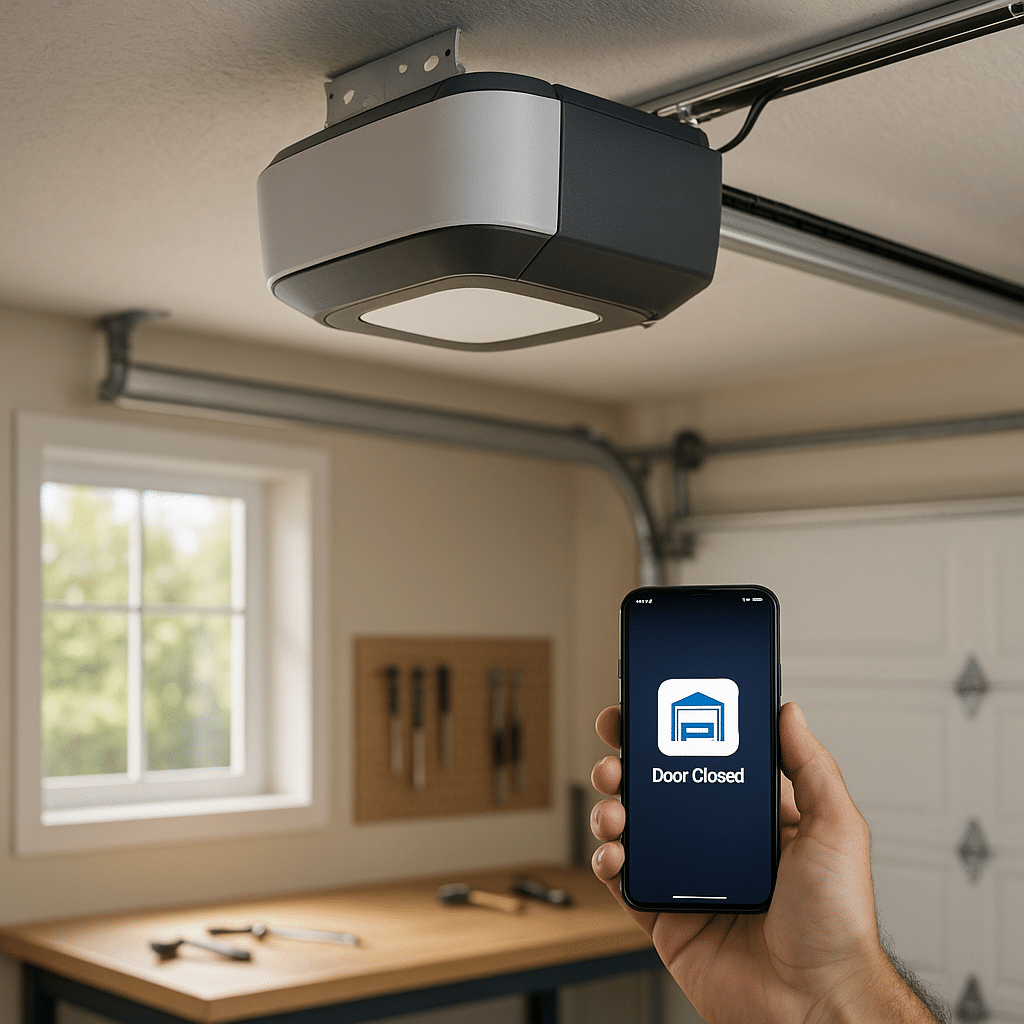
Securing Your Remotes and Keypads
Simple habits can also play a role in prevention. Be mindful of where you keep your garage door remotes.
Avoid leaving remotes unsecured in your car, especially if the car is parked outside. Treat your garage remote like a house key.
If you use an external keypad, consider changing the access code periodically, especially if multiple people know it. Ensure the keypad is in good condition and replace it if buttons are sticking or it’s showing signs of damage.
These simple steps regarding your control devices reduce the chance of accidental activation or unauthorized use that could lead to your garage door opening and closing without your direct command.
By incorporating regular maintenance, considering timely upgrades, and being mindful of your access devices, you can significantly improve the reliability and security of your garage door system. This helps ensure your garage door only opens when you intend it to.
Conclusion: Get Your Garage Door Working Properly Again
Discovering your garage door open without explanation is a situation no homeowner wants to face. It immediately raises concerns about security and the reliability of your home’s entry points. As we’ve explored, there isn’t just one single reason your garage door might open on its own.
The causes can range from simple, easy-to-fix problems like a stuck button on a garage door remote to more complex issues involving the garage door opener circuit board or electrical system. Interference, power surges, or even just an aging, older garage door opener can also be the culprit behind a garage door randomly opens situation.
The good news is that many of these issues can be identified through systematic troubleshooting steps. Checking your remotes and keypads, inspecting the safety garage door sensors, examining visible wiring, and performing a simple reset are all actions you can take yourself to try and diagnose the problem and potentially stop your garage door from opening unexpectedly.
However, it’s important to recognize when the issue is beyond your comfort level or expertise. Problems involving internal electrical components, suspected opener failure, or anything that feels unsafe should prompt you to call a garage door professional. A qualified garage door technician has the knowledge and tools to safely and effectively fix the problem and ensure your entire garage door system is functioning correctly.
Ultimately, ensuring your garage door is not opening by itself is vital for your home’s security and your peace of mind. Regular garage door maintenance and considering upgrades to modern garage door openers can help prevent these issues from occurring in the first place. Don’t ignore the problem; get to the root of your garage door issue and ensure your garage door only opens when you want it to. Call a reputable garage door service if you need assistance to get your garage door working properly and safely again.
